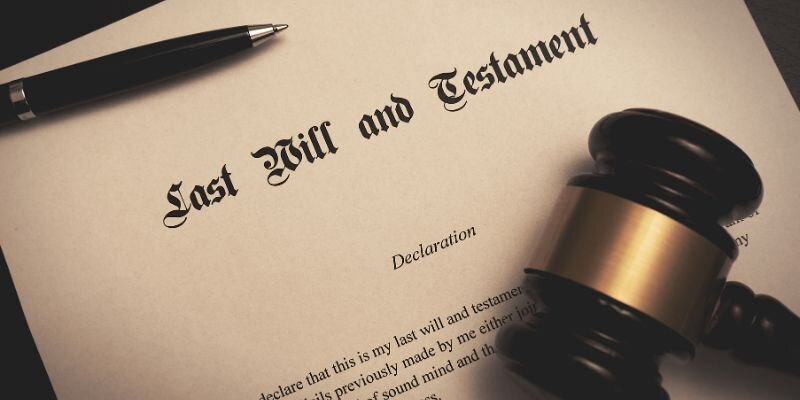
When talking about changing a will in Fairfax, VA, it’s important to know what an executor’s rights and duties are. This job, which is typically given in a will, is to carry out the deceased person’s desires for their estate. But a lot of people ask if an executor can amend a will. This site goes over the details of executor rights in Virginia, which is important information for anyone who is organizing or carrying out an estate. If you’re an executor or a beneficiary, it’s important to know how to handle these legal matters clearly so that the deceased’s wishes are followed and their assets are divided fairly and lawfully. The 4 Brothers Buy Houses Team can help you understand more about estate-related property solutions.
Understanding the Role of an Executor in Fairfax, VA
An executor is very important for managing an estate, especially in Virginia, where the laws about estate planning are different from those in other states. The executor is in charge of managing and settling the deceased person’s estate. This means dealing with complicated tasks like managing assets, handling inheritance issues, and making sure that estate property is passed on to beneficiaries smoothly. It’s important to know these important tasks and limits, like how you can’t change the will. This study will elucidate an executor’s responsibilities and the legal constraints established by the Virginia code.
What Responsibilities Does an Executor Have?
An executor’s main responsibility in Fairfax, VA, is to accurately carry out the decedent’s wishes as stated in their will. This involves a broad spectrum of responsibilities, starting with the probate process. Probate is the official proving of the will, which entails the formal legal process of authenticating the will in a probate court. The executor must file the will with the appropriate probate authority, usually with the help of a probate attorney, to initiate estate administration. Managing the estate property, the executor is responsible for inventorying all assets, including real estate, bank accounts, investments, and personal property. Valuing these assets and settling all debts and obligations form a significant part of their duties. If the estate includes real property, remember that we buy houses in Fairfax to help executors and beneficiaries sell inherited homes quickly and efficiently.
Asset management is more than just keeping an eye on money; it also means making sure that all assets are safe until they can be given to the right people. Executors must also make sure that the assets are distributed according to the will, following all legal and moral rules. Communication is also very important because the executor needs to talk to the beneficiaries regularly about how the estate is doing. If there are disagreements about inheritances or problems with how to interpret the will, the executor may need to work with estate litigation lawyers to settle these issues. Working with professionals like accountants and estate planners makes sure that Virginia’s tax laws are followed and that the decedent’s wishes are carried out smoothly.
Can the Executor Change the Will in Virginia?
One frequent concern for beneficiaries in Virginia is whether the executor can change the will. According to legal statutes and estate planning principles, executors cannot amend or change the will. The role of the executor is to carry out the provisions established by the decedent before their passing. Any actions that deviate from the explicit wishes expressed in the will are not within the executor’s rights. Executors must operate under the Virginia code, which fortifies the decedent’s original intentions by providing a legal framework to negate potential alterations posthumously.
If executors try to change or override parts of the will, they could face legal problems. If beneficiaries think that an executor is not following the will, they can go to probate court to get help. Beneficiaries can file for estate litigation if they think the executor is doing something wrong or that they will manipulate the situation. This could lead to the executor being removed. The executor also has a fiduciary duty to the estate and its beneficiaries, which means that they must make sure that all decisions are in the best interests of the estate and that they don’t make any changes without permission.
Executor changes usually need proof of a real mistake or oversight in the will that the probate court thinks is necessary for the change. Otherwise, changes can only be made if a court order says so, which keeps the estate’s integrity intact. Knowing these limits makes sure that both executors and beneficiaries know what their rights are during the often hard process of managing an estate. Beneficiaries should read the will carefully to fully understand what they are entitled to. This adds another level of openness and awareness to estate administration in Fairfax, Virginia.
Legal Framework for Executors in Virginia

To manage an estate well, you need to know the laws that apply to executors in Virginia. The probate court chooses executors, also called personal representatives, to carry out the will and take care of the deceased person’s estate. They are very important in making sure that the estate property is managed in accordance with the wishes stated in the will and the Virginia code. Executors work with an estate attorney to figure out the legal issues that come up with assets, trusts, and the probate process. In this part, we’ll talk about the executor’s powers and how important estate lawyers are in Northern Virginia.
What Powers Are Granted to Executors by the Probate Court?
In Virginia, the powers granted to executors by the probate court are decisive for carrying out their responsibilities effectively. Once appointed, executors manage the estate’s assets in several ways. They primarily serve as stewards, protecting the estate by accounting for and properly maintaining all assets and finances until their rightful distribution. They are empowered to pay off debts and taxes the estate owes, which requires meticulous financial oversight and sometimes asset liquidation. The legal powers granted are specifically designed to prevent unauthorized actions, such as altering the will or acting outside the interests of the beneficiaries. Under the Virginia code, executors must operate transparently, informing all involved parties about estate administration progress.
Moreover, the probate court provides a legal framework to ensure executors make decisions that uphold the estate and its beneficiaries’ best interests. This involves exercising their powers to settle any disputes that may arise among beneficiaries, for which they might need to seek approval from the court or work closely with a probate attorney. The court also demands that executors follow predetermined legal processes and adhere to estate planning protocols to uphold ethical standards. These regulations are vital to protect beneficiaries’ rights and ensure the decedent’s intentions are honored without legal conflicts. Compliance with such requirements is essential in maintaining the integrity of estate administration in Fairfax and across Northern Virginia.
The Role of the Estate Attorney in Guiding Executors
An estate attorney is critical in providing the necessary guidance to executors, ensuring they operate within the legal boundaries set by Virginia’s legal framework. The intricate nature of estate planning often necessitates professional legal advice, which estate attorneys supply. They guide the court to understand their rights and duties thoroughly. Executors rely on these attorneys, particularly for interpreting complex legal documents and ensuring that all actions align with state laws. This helps executors avoid potential legal pitfalls during the estate management process.
When executors face problems like legal battles over how to distribute assets or claims from creditors, it can be helpful to get legal advice from estate lawyers. An estate lawyer can help you figure out how to handle these problems in the best way possible, keeping you and the agent out of trouble with the law. If you live in Northern Virginia, where estate laws can be very complicated, having an experienced lawyer by your side as an agent can make the process much easier and make sure it follows all the rules.
Estate lawyers are also very important when it comes to defending executors in probate court. They do this by advocating for them and helping them do their jobs better. An attorney’s help is very important when you need to handle paperwork, communicate with beneficiaries, or give the probate court the papers they need. So, executors need to work closely with these lawyers to make sure that every step of the estate planning and management process is done correctly and with the necessary care, as required by Fairfield, VA law.
Handling Estate Administration in Fairfax

In Fairfax, managing an estate involves understanding local legalities and processes, which are crucial for efficient estate administration. If selling inherited property is part of the process, you can see how our process works for a smooth, stress-free sale. Executors must follow Virginia laws, ensuring compliance with the estate planning protocols outlined in the will. The probate process oversees these requirements, safeguarding beneficiaries’ interests and protecting property rights. Executors, continually guided by legal frameworks, face the responsibility of estate management, including asset distribution and debt settlement. This section analyzes how Virginia’s legal framework impacts estate administration, highlighting essential steps executors must take to manage estates properly.
The Impact of Virginia Laws on Estate Administration
Virginia laws significantly influence the estate administration process in Fairfax. The state imposes a comprehensive legal framework that executors must adhere to, aligning their duties with the Virginia code’s requirements. This involves understanding the legal landscape that defines their rights and limitations as estate representatives. Executors in Fairfax must navigate various laws, including those that govern probate and estate litigation. Virginia’s probate laws, which outline the procedures and limitations surrounding estate administration, guarantee the respect of the deceased’s wishes and the appropriate handling of estate property. Executors also must comply with procedural tasks mandated by the court, ensuring transparency and accountability in all dealings with beneficiaries and estate assets.
The Virginia code outlines specific procedures for addressing and distributing assets, which are integral to the probate process. Executors must record an inventory of the estate and be meticulous in managing estate property, adhering to precise legal requirements to avoid conflicts. Executors must prioritize debt settlements and tax obligations under Virginia’s estate laws to ensure the estate remains solvent before fulfilling beneficiary claims. Understanding these legal aspects helps meet beneficiaries’ expectations and reinforces the executor’s role as a fiduciary steward.
Lawyers specializing in Virginia estate planning are invaluable to executors, offering guidance and advice on complex legal challenges. Compliance with estate laws protects the executor and beneficiaries from potential legal disputes or estate litigation. In Fairfax, executors frequently work with legal professionals to ensure property and assets are managed according to the will’s specifications and existing Virginia laws. The legal structure in Virginia ensures executors operate within a transparent and accountable system, promoting a smooth transition of assets and playing a significant part in safeguarding the rights of all parties involved.
Steps to Ensure Proper Estate Management
Fairfax’s property management is organized and starts with a clear understanding of how probate works. First, executors must make sure that the will is filed with the probate court, which starts the official process. The court is very important for making sure that Virginia laws are followed and for dealing with issues related to estate litigation. Taking care of estate assets is a big job that involves making a detailed list of all the property, such as real estate, trusts, and other valuables, and figuring out how much they are worth. Executors must also keep track of and protect these assets, making sure they are given out according to the will’s instructions once all debts are paid.
As executor, your job is to carefully watch over the money, making sure that all bills and taxes are paid before giving money to beneficiaries. This precaution against possible disagreements and legal problems shows how important it is to have clear financial records. One of an executor’s duties is to keep lines of contact open with the beneficiaries and let them know about any problems or progress with the estate. Clear communication builds trust and lowers the risk of estate dispute that goes badly. Hiring experienced lawyers is another important step that makes it easier for executors to handle estates effectively.
Legal guidance from probate or estate-planning lawyers ensures all actions align with Fairfax’s legal requirements. Attorneys assist with interpreting complex legal documents and guide executors through the intricacies of estate management. Liability is a concern for executors, making adherence to all legal protocols imperative. In circumstances where estate litigation might arise, having legal representation supports the executor in navigating disputes, ultimately facilitating a resolution that adheres to Virginia’s statutes. With these considerations, executors can fulfill their duties proficiently, ensuring the estate administration process in Fairfax upholds both legal standards and the deceased’s wishes.
Challenges Executors May Face

In Fairfax, Virginia, being an agent means taking care of a lot of different duties while following the rules set out in the Virginia code. Executors often have big problems, especially when it comes to following the will exactly and not doing anything wrong. To get around these problems, executors need to know what the legal options are for bad behavior and make sure they follow through with what the heirs want. Executors have to deal with all of these issues while handling testate assets, settling disputes, and following probate laws to keep things legal and make sure the estate administration goes smoothly. If property is located outside Fairfax, you can sell your Arlington house faster to streamline the process and reduce holding costs.
What to Do if an Executor Fails to Comply with the Will?
If an agent doesn’t follow the will, it can cause big problems for the beneficiaries and make the law more complicated. This usually happens when the executor doesn’t do their job, like distributing assets, or doesn’t follow the directions in the will. In Virginia, the legal system gives us a way to handle these kinds of scenarios that protect the integrity of the estate. The first step is generally to talk to the executor directly about your concerns and point out specific actions that go against the will. By taking this method, misunderstandings can be cleared up and compliance can be made easier without getting legal.
If beneficiaries’ attempts at informal resolution are unsuccessful, they have the option to seek the assistance of a probate attorney. If you need assistance analyzing your case facts and determining your best legal options, consulting an attorney that focuses in estate litigation is a great first step. One option is to seek judicial intervention to ensure that the executor complies with the will by submitting a petition to the probate court, which would challenge the executor’s conduct. By following these formal procedures, the executor can be held accountable for carrying out the decedent’s wishes as stated in the will and protecting the rights of the beneficiaries.
Moreover, the probate court can remove an executor if substantial evidence of non-compliance or misconduct is presented. This decision usually arises from either the executor’s failure to meet fiduciary responsibilities or intentional manipulation of the estate that harms the beneficiaries. Legal frameworks like the Virginia Code ensure court oversight maintains fairness, holds executors accountable, and ensures proper estate management. Thus, taking definitive legal action becomes crucial when informal attempts to resolve compliance issues fail to yield results, protecting the estate’s interests and maintaining the legal integrity of estate administration.
Legal Recourse for Misconduct by an Executor
Executor misconduct presents considerable hazards to estate management, frequently requiring legal intervention. Misconduct can show itself in a lot of different ways, such as not taking care of estate assets properly, taking money without permission, or giving certain beneficiaries more attention than others. To deal with this kind of wrongdoing, you have to go through Virginia’s legal system, which has ways to preserve the estate’s integrity and the beneficiaries’ interests. The first thing to do if you think someone is doing something wrong is to talk to a probate lawyer to get their opinion on the matter and see what legal options are available.
Beneficiaries can file a lawsuit against the executor, primarily through the probate court, alleging breach of fiduciary duty. Courts scrutinize executor actions under the Virginia code, requiring evidence that proves misconduct has harmed the estate or beneficiaries. The court may enforce corrective actions, such as ordering the executor to reimburse misused funds or reverse improper asset distributions. Additionally, beneficiaries might seek the executor’s removal if sustained misconduct or conflict of interest is evident. This harsh yet necessary measure protects the estate from further harm and ensures competent estate administration.
Also, mediation might be offered before going to full-on court, which gives people a chance to settle their differences peacefully with a neutral third party. If it works, mediation can avoid long court cases and make it easier for the executor and receivers to work together. In the end, the fact that executors can be sued in Virginia for wrongdoing shows how important it is to follow fiduciary standards. Trustees, beneficiaries, and the court system work together to make sure executors do their jobs in a way that follows the will of the person who died and keeps the estate’s dignity.
Helpful Fairfax Blog Articles
- Documents For Selling Your Home In Fairfax, VA
- Selling Your Fairfax, VA Home With Foundation Problems
- Selling A House With Code Violations In Fairfax, VA
- Closing Costs When Selling A Home Without An Agent In Fairfax, VA
- How To Sell A House With Title Issues In Fairfax, VA
- Selling A House With Termite Damage In Fairfax, VA
- Tax Implications of Selling Home In Fairfax, VA
- Can You Sell House With Tenants in Fairfax, VA
- Refinance a House After Divorce in Fairfax, VA
- Cost of Asbestos Removal in Fairfax, VA
- Selling a House with a Mortgage Work in Fairfax, VA
- Understanding Executor Rights in Fairfax, VA
- How to Sell a House in Bankruptcy in Fairfax, VA
- Selling a House After 3 Years in Fairfax, VA
- Selling Shares of Your Home in Fairfax, VA
- Sell House and Rent Back Option in Fairfax, VA

| Executor Responsibilities | Legal Powers | Role of Estates Attorney | Compliance Requirements |
|---|---|---|---|
| Manage and safeguard estate assets | Represent the estate in legal proceedings | Provide legal advice on estate management | Adhere to Virginia probate laws |
| Settle debts and taxes | Sell estate assets to liquidate debt | Assist in the preparation of legal documents | File necessary tax returns on time |
| Distribute assets to beneficiaries | Submit the final accounting to the court | Ensure compliance with the will stipulations | Maintain accurate records of estate transactions |
| Close the estate formally | Negotiate settlements with creditors | Mediate disputes among beneficiaries | Submit the final accounting the to the court |
